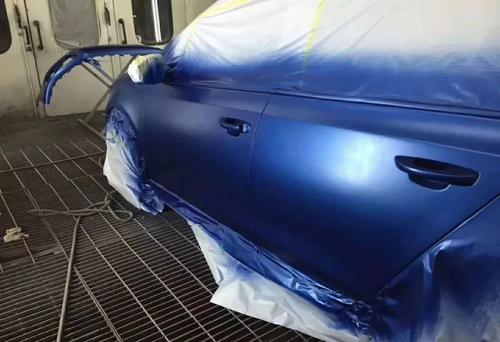The main components of automotive paint
Car paint is mainly composed of resin, pigments, additives, fillers, curing agents, solvents, and other components. In addition, flash gold powder is added next to the metal car paint, and mica particles are added next to the pearl paint. What are the specific components? Next, let's follow the editor to learn more!
1、 Resin: It is attributed to film-forming substances. And resins can be divided into: natural resins and artificially synthesized resins
1. Natural resin elucidation: The secretion of insects or trees. Ingredients: rosin, shellac
2. Explanation of thermoplastic properties of synthetic resins: they soften at high temperatures and are easily susceptible to solvents and solvents.
3. Explanation of thermosetting properties of synthetic resin: heating is not easy to soften, has high hardness, and is solvent resistant.
4. Artificial synthetic tree self crosslinking type elucidation: When two components are mixed, chemical reactions occur and solidify.

2、 Pigments: This includes physical pigments, anti-corrosion pigments, and coloring pigments. It can be divided into the following types: anti-corrosion pigments, physical pigments, coloring pigments, etc.
1. Anticorrosive pigments: Widely used in primers to enhance their anti-corrosion properties.
2. Physical pigments: improve the thickness and abrasiveness of paint films, and are the main pigments used for primers and other coatings.
3. Coloring pigments: provide color and covering power.
3、 Solvents, also known as additives, are compounds with various special functions inside. So in general, it is necessary to have a small number of participants on the paint side, so as to obtain or improve the special functions of the paint, but the maximum proportion on the paint side does not exceed 5%. The types of additives include dispersants, defoamers, curing accelerators, anti shedding additives, softeners, anti-corrosion additives, leveling agents, anti settling agents, UV absorbers, antioxidants, anti pinhole agents, etc. The role of side additives is very important for paint. As anything with color will fade under sunlight, so is car paint. The pigment inside will also fade under sunlight, so adding additives to the paint is very important. For example, ultraviolet absorbers, antioxidants, etc., combined with these additives, can extend the fading time and avoid premature aging of the paint. Many times, the quality of additives determines the quality of paint to a certain extent.
4、 Filler: Refers to a physical pigment used in primers to improve film thickness and abrasiveness.
5、 Curing agent: used for self crosslinking resins, which undergo chemical reactions and solidify when two components are mixed.
6、 Solvent: A liquid with multiple uses. It can dissolve resin and adjust viscosity, making it easier for pigments and resins to mix, ensuring that the paint has construction viscosity, and can also be used to clean spray guns and residual paint stuck to hands and objects.
Article source: Automotive repair paint Www.m.xywangpai.com
-
08-25
Common problems with automotive repair paint
Why are the orange lines on the surface of the varnish so heavy after each spray? Why on earth? How can we prevent a decrease?Answer: The thinness of the varnish, the amount of paint produced by the s
-
06-05
The car repair paint manufacturer told you about the problem with water-based coatings
1. How long does it take for a skilled paint coating technician to master the operation of water paint?Generally, practice and understanding with less than half a sound can be mastered, and proficienc
-
05-31
Qingyuan Automobile Repair Paint Company tells you the steps for painting
Automotive Painting Process(1) Rust prevention and internal painting of the vehicle body: Depending on the condition of the vehicle body, it will be completed by a sheet metal worker.(2) Polishing and
-
05-12
Why does car repair paint lack luster?
If there is a lack of gloss on the surface of the originally flat and smooth car paint surface, especially during the process of car paint care, it can be observed under a microscope that the surface
